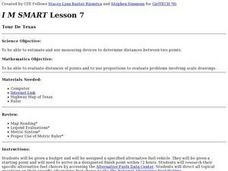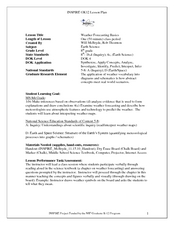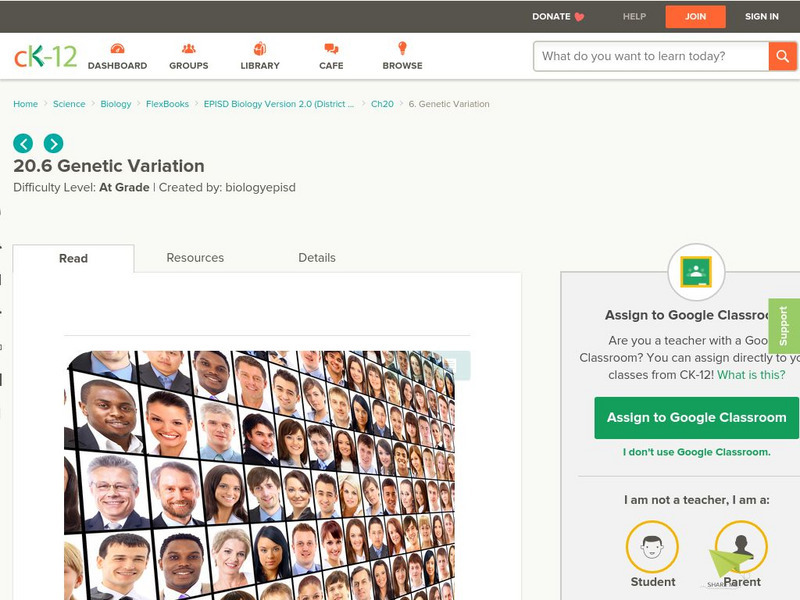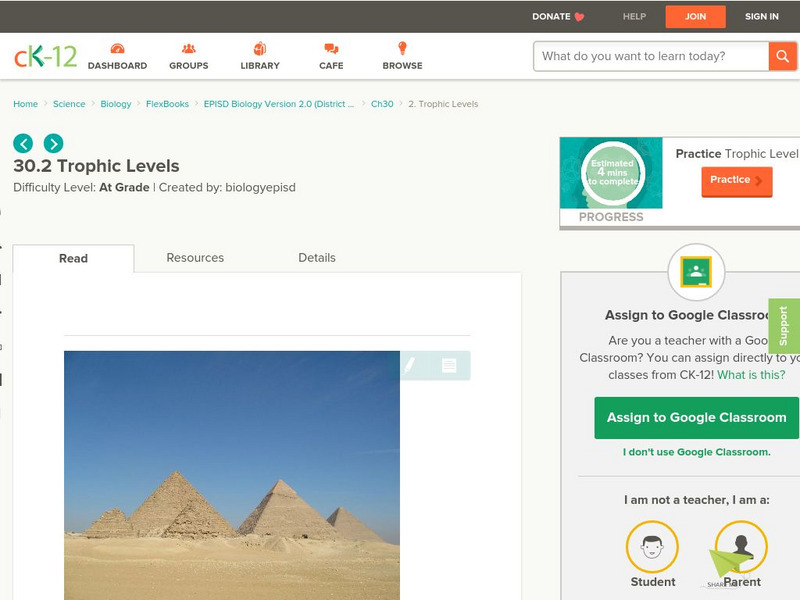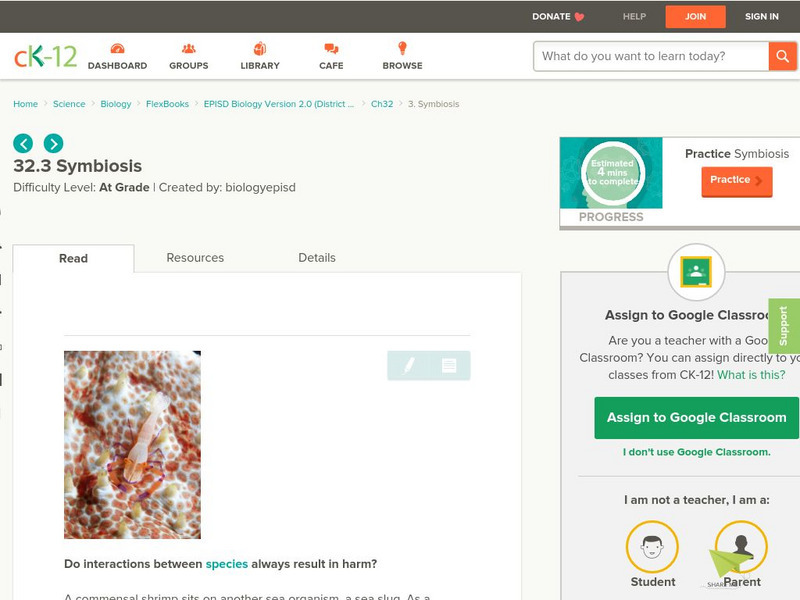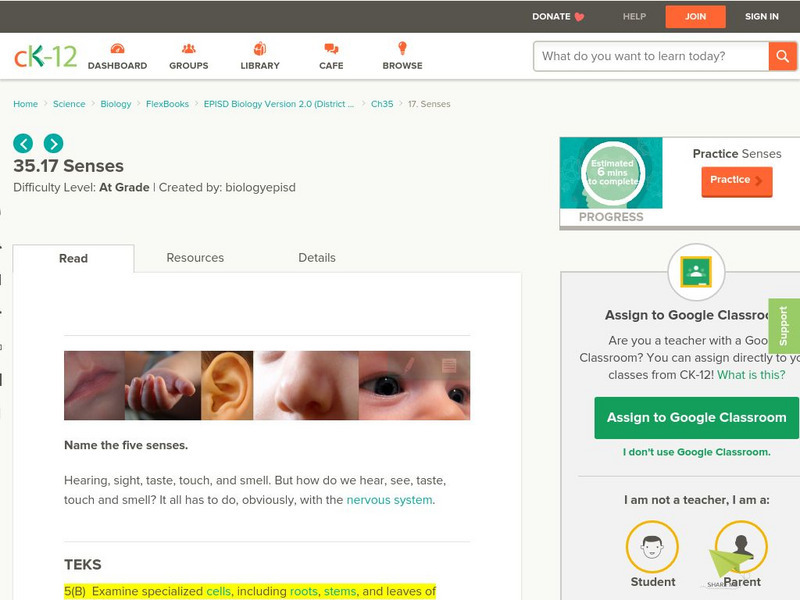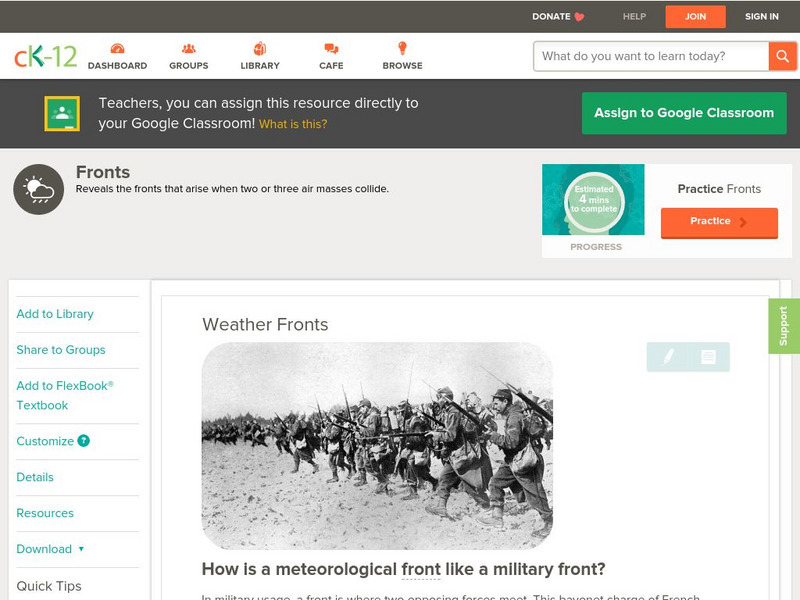Curated OER
What's Bright Red and Invisible?
Students study that very little sunlight penetrates the ocean below depths of 200 meters. They study that no light penetrates the ocean below depths of 1000 meters. They study that the quality of light changes as depth increase
Curated OER
World War II Memories
Fifth graders utilize primary sources provided to formulate questions to prepare for an interview. Veterans and civilians who lived during World War II are interviewed by students and their work displayed on a web site.
Curated OER
Desert Discoveries
Students correspond with Israeli students from Jerusalem by email as part of a study on desert and semi-arid regions. They conduct background research and become proficient in the use of electronic mail.
Curated OER
PASS the Arts
Students explore math and art concepts, create digital art examples of the concepts, and incorporate these works into a PowerPoint portfolio with explanation and analysis.
Curated OER
Water Quality of Local Lakes
Students research the quality of water in a regional lake of West Bloomfield in the past and present. They compare conditions of the lake, past and present. They then give examples of local and regional human activities that may have had...
Curated OER
Forces Cause Change
Third graders will gain recognition that physical relationships affect each other and that change occurs when one object acts upon another.The teacher will recognize ways in which technology can be used to enhance the understanding of...
Curated OER
Tour De Texas
Students are given a budget and an alternative-fuel vehicle. Using a map of Texas, they are given a starting point and determine how to arrive at their destination within 72 hours. They use the internet to research the alternative fuel...
Curated OER
Zebrafish as a Model for Muscle Development
Students explore the steps of protein synthesis in zebrafish. They view video clips to identify the parts of a zebrafish and observe them as they sequence the developmental stages. In groups they identify the muscles and how proteins are...
Curated OER
Chip Challenge School Registration Form
In this registration worksheet, information is collected on the school and classes participating in the Chip Challenge. Teachers are provided with Chip Pal responsibilities.
Curated OER
Weather Forecasting Basics
Eighth graders analyze weather diagrams and weather maps. In this earth science instructional activity, 8th graders explain why it is important to know the weather. They complete a handout at the end of the instructional activity.
Curated OER
Mississippi’s Contribution to Space Exploration
Eighth graders engage in a class discussion while going through a PowerPoint on Mississippi's contribution to space exploration. In this Space science lesson plan, the students will also participate in Brain Pop quizzes where they will...
Curated OER
Ecology: Adaptations
Eighth graders identify different types of adaptation in organisms. In this biology lesson plan, 8th graders explain how adaptation help organisms survive. They complete a worksheet at the end of the lesson plan.
CK-12 Foundation
Ck 12: Episd: Limiting Factors to Population Growth
[Free Registration/Login may be required to access all resource tools.] Recognize limiting factors to the population growth and understand how the factors influence the growth in poplution.
CK-12 Foundation
Ck 12: Episd: Genetic Variation
[Free Registration/Login may be required to access all resource tools.] How does genetic variation protect species from extinction? Understand sexual reproduction and the importance of both random fertilization and independent assortment.
CK-12 Foundation
Ck 12: Episd: Trophic Levels
[Free Registration/Login may be required to access all resource tools.] Understand what trophic levels are and identify producers and consumers in a food web.
CK-12 Foundation
Ck 12: Episd: Symbiosis
[Free Registration/Login may be required to access all resource tools.] Identify and understand the various types of symbiotic relationships. Recognize the three primary kinds of symbiosis.
CK-12 Foundation
Ck 12: Episd: Organization of the Human Body
[Free Registration/Login may be required to access all resource tools.] From basic cells to tissue to organ systems, identify and understand the structures and functions of the human body's organization.
CK-12 Foundation
Ck 12: Senses
[Free Registration/Login may be required to access all resource tools.] The following online tutorial explains how sensory stimuli are perceived and interpreted.
CK-12 Foundation
Ck 12: Characteristics of Life
[Free Registration/Login may be required to access all resource tools.] Videos, texts, activities, and assessments about the factors that characterize living things.
CK-12 Foundation
Ck 12: Earth Science: Weather Fronts
[Free Registration/Login may be required to access all resource tools.] Describes the weather fronts that occur when two air masses collide. Includes downloadable handouts.
US Geological Survey
U.s. Geological Survey: Water Cycle
An in-depth explanation of the Earth's water cycle, including a hyperlinked diagram that provides direct access to information about each phase in the cycle.
Other
Get Body Smart: Human Anatomy and Physiology: Skeletal System
Students can learn about the human skeletal system through this easy-to-access tutorial. Sections include an introduction, organization of the skeleton, appendicular skeleton, and the axial skeleton. Interactive quizzes for each section...
CK-12 Foundation
Ck 12: Reproduction
Read about the two types of reproduction: sexual and asexual. Review questions follow the module. [Free Registration/Login may be required to access all resource tools.]
Other
Get Body Smart: Respiratory System: Anatomy and Physiology
Students can learn about the human respiratory system's structures and functions through this easy-to-access tutorial. Sections include major zones and divisions, the nose and nasal cavity, the pharynx, the larynx, the trachea and...
Other popular searches
- Ms Access 2003
- Ms Access 2007
- Ms Access Databases
- Using Ms Access
- Activities Using Ms Access
- Ms Access Lessons Plan
- Activities Ms Access
- Ms Access 2010
- Ms Access 2007 Weather
- Ms Access 2010 Lesson








